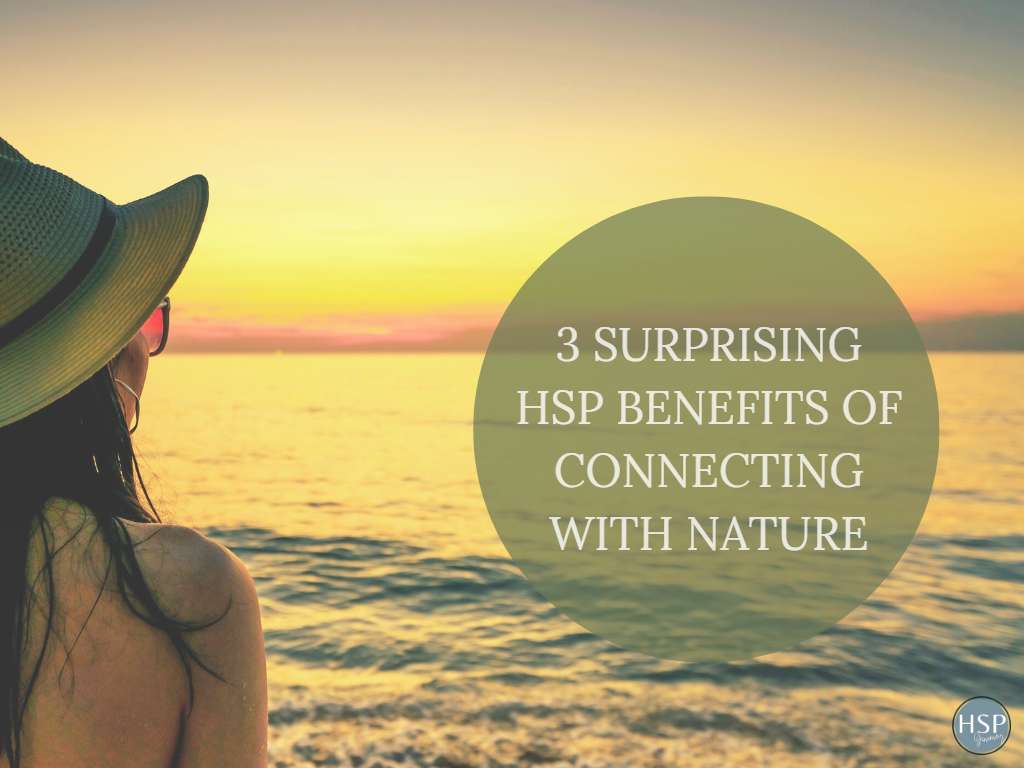There is nothing that helps me calm down, be present, and feel whole like staring at the waves on a large body of water. I grew up on the shore of Lake Erie, where lapping rollers could turn into roaring ten-foot whitecaps in a matter of moments. Some of my favorite travel memories are of icy sprays blowing off the Baltic Sea, gentle undulations in a ferry on the English Channel, and Atlantic coast thunderstorms sending waves screaming along the coast.
Small or large, salty or fresh, waves connect me to nature. And like most highly sensitive people (HSPs), being connected to nature is very good for my body, mind, and spirit. You might be interested in these three surprising HSP benefits of connecting with nature. I hope they encourage you to take regular time to connect with nature.

Table of Contents
Do Highly Sensitive People Benefit More from Nature?
Being connected to nature is good for all people, but especially for HSPs. Research into differential susceptibility consistently shows that HSPs benefit more than non-HSPs from positive experiences. Getting to watch waves, walk through a meadow, or spend time with animals makes more of a difference to those of us who are highly sensitive.
And not surprisingly given our tendency to process experiences deeply, the more profoundly we connect to nature, the more benefits we get as HSPs
What Kinds of Benefits Come from Connecting with Nature?
I love when I can ask my therapy clients to connect with nature as a follow-up intention to support our work. I know that this is the kind of “homework” that people are likely to do because it feels good to stare at the trees on your block, play with you pet, or get some fresh air while looking for shapes in the clouds.
Translated into therapy-speak, three surprising benefits of connecting with nature include:
Benefit #1 – Reducing Overstimulation and Overwhelm
Time spent in nature helps us slow down and regulate our nervous systems. Ideally, we are taking a break from hectic schedules and looking at screens, savoring the natural boundaries that going into nature creates around the stress of daily life. With less input coming at us, our minds, bodies, and emotions can settle into a relaxed state.
Benefit #2 – Practicing Mindfulness
As we notice the weather conditions, look to see what plants have changed as the seasons progress, or search for a bird by sight or song, we naturally engage in mindful awareness of the present. We tune into our sensory awareness (a definite HSP strength) in ways that can create pleasure and ease. We’re also likely to take a break from judging and just practice observing when we step outside of our daily routines to connect with nature. Mindfulness—nonjudging awareness of the present moment—can help us with anxiety, depression, and physical health issues. It also helps us appreciate these moments with nature and form vivid memories that we can revisit at a later time.
Benefit #3 – Engaging in Aesthetic Appreciation
HSPs are by nature more aware of beauty and the aesthetics of the world around us. What better place to discover a beautiful pattern, texture, or scent than in nature? Feeding our need for aesthetically pleasing experiences through connecting to the natural world gives us healthy outlets for the drive to experience beauty, wonder, and awe. For many people, this aspect of being in nature is a way of connecting deeply with their spirituality, another key concern of highly sensitive people.
Looking for HSP Tools to Thrive in a Chaotic World?
The modern world is often overwhelming and stressful for those of us with sensitive nervous systems. Many of us have suffered from the challenges of high stress, anxiety, sensory overload, and mental health and physical health issues. Fortunately, after years of working with and researching Highly Sensitive People (HSPs), Julie Bjelland has developed many tools that have not only helped her but thousands of HSPs all over the world move out of survival mode living and into thriving. In this free webinar, she’ll share the tools that HSPs have found the most life-changing. Her goal is to help you live to your fullest potential because the world needs you.
Join this free webinar and get tools to help you thrive as an HSP!
We Are Part of Nature
It can be easy to get disconnected from nature in the throes of modern life. Most of us spend the vast majority of our time in climate-controlled buildings and vehicles, using electric lights, buying whatever food we want regardless of the time of year or our location.
Technology has outpaced our ability to adapt. My hunch is that, on some level, HSPs feel this tension in living so disconnected from natural rhythms and seasonal cycles.
Intentionally spending time connecting to nature is a way to relieve some of this tension and give our nervous systems an experience of what we are missing when we live our ultracivilized lifestyles. We can slow down, stop chasing whatever is coming next, learn to live with ebbs and flows. We remind ourselves of our true place within nature, not separate from it.
You Don’t Have to Radically Alter Your Life to Benefit from Connecting with Nature as an HSP
I’m the first to say that a part of me longs to be a hermit on a secluded beach, watching the tide roll in and out from a clifftop cave. But realistically? I like indoor plumbing and my e-reader a little too much to run away from society. And I’d miss my family, my work, and my dog (although he’d probably love to escape suburbia, too).
Start with the reality of your life and make space to connect with nature within this context. Maybe you spend time watching a bird feeder, going to the park, or being mindful of the weather. Notice the feel of wind on your skin. Smell your neighbor’s flowers when you’re on a walk. Visit an animal sanctuary.
You only need to connect to nature as you encounter it to get the benefits it brings.
What if you aren’t able to get outside or, like me since I moved inland, your preferred ways of connecting to nature aren’t accessible in your everyday life? You might be heartened to learn that virtual exposures to nature can have a positive impact on our mood. Find a live web broadcast that appeals to you. I love the live cameras from the Monterey Bay Aquarium. Other people prefer livestreams of the beach, bird nests, or a forest river https://explore.org/livecams/zen-den/live-redwood-cam-1. I suspect there’s a webcam for nearly any natural environment you’d like to visit.

Looking for an HSP-Trained coach to help you align your life with your priorities?
Through my Highly Sensitive Person (HSP) certification with the Nickerson Institute, as well as being an HSP, I offer HSP coaching to develop specific goals around your HSP needs. We HSPs frequently deal with anxiety and overstimulated nervous systems that prevent us from achieving peace and attaining our life goals. HSP coaching with me includes a detailed review of your sensitivities and a mutually-desired plan for growth and management of this superpower to shift negativity and begin seeing yourself as the hero of your own story. (Affordable monthly coaching begins at $150/month.)
Just Start – Connecting with Nature Will Reward You and Calm Your HSP Nervous System
Whatever ways that you’re drawn to nature, start today to nurture those connections. You don’t have to wait to take the perfect beach vacation to commune with nature (not that you shouldn’t do that if you can).
Combine your nature time with other things you do for your health. Walking and exercising are a clear fit with spending time in nature. Many people like to go outside to journal, sketch, take photos, or even create “found art” using fallen leaves, branches, and stones (just be sure to return your art elements to the way you found them for the sake of critters that depend on them).
Connecting with nature is an easy daily practice that is good for you as a highly sensitive person. That’s the kind of medicine we all can enjoy!
Be sensitive, be free
*This post contains affiliate links and I will be compensated if you make a purchase after clicking on my links*




